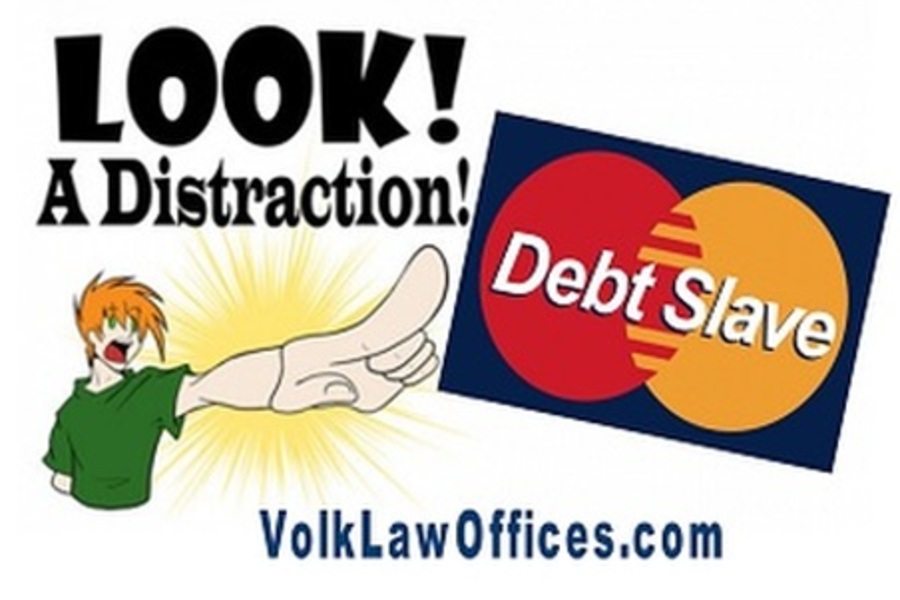Distracting Debt Does Damage
Posted: November 10th, 2017
Written by: David J. Volk, Esq. | April 23, 2017
Since the readers of this blog are generally all high achievers, you might want to share this blog with youngsters or others who are still learning to be good with money.
To be successful, you have to be able to value and concentrate for extended periods of time on your work and other important things in your life like family, faith, friendships, and helping others. You have to pay attention to those important parts of your life. If anything threatens your attention span in those areas, it threatens your success in those areas.
Inability to pay debt is a risk to your attention span attention in those areas. How long is your attention span? What can you do to improve it?
The Merriam-Webster.com dictionary defines attention span as the length of time during which one is able to concentrate or remain interested. When we are distracted, our attention span is reduced. The Merriam-Webster.com dictionary defines distraction as mental confusion caused by something that directs one's attention away from something else. Avoid the debt distraction if you want to reach your full potential.
Debt that you have difficulty paying is one of life’s major distractions. The damage it can do is stunning. Amy Novotney writes in the American Psychology Association’s gradPsych Magazine:
"Nearly 64 percent of psychology graduate students report that concern over finances and debt interferes with their optimal functioning, according to a May 2012 study in Training and Education in Professional Psychology (PDF, 106KB). The research, which included a survey of 438 students enrolled in psychology graduate programs, found that money concerns ranked second in student stressors, just under academic responsibilities."
In a separate survey of 10,000 people in the United Kingdom, Gathergood found that those who struggle to pay off their loans are more than twice as likely to experience a host of mental health problems, including depression and severe anxiety (The Economic Journal, September 2012).
That sounds pretty bad. If psychology grad students have problems dealing with the debt issue, the rest of us are probably at greater risk.
If you are out of work and miss some paychecks, the financial strain can be immense. Writing in Psychology Today, Melanie Greenberg, Ph.D. says:
"A spouse's job loss can also put strain on a marriage. Spouses may blame each other for not cutting spending, not going back to work soon enough, or not foreseeing this happening and finding another position in time. In addition, many people deal with stress by increasing alcohol intake or converting stress into anger, potentially leading to increases in spousal arguments, domestic violence, health and legal problems. Increasing financial stress or transition also exacerbates pre-existing marital and relationship problems. Stress, increased responsibilities, and obsessing over finding a job can decrease desire and sexual interest. Increased stress can also increase marital arguments or lead to lack of communication if one or both spouses shuts down & withdraws emotionally. Job loss can evoke shame and regret, which can lead to depression, with further negative relationship impact. Lack of money for babysitters or date nights can decrease opportunities for having fun together, which is a key element of romance."
That all seems very logical. Of course, our logic improves when we have been through a crisis. What we have to work hard at is foreseeing the possibility of a future crisis and try to prepare for that. I frequently go to court. My focus is on what I need to do and that includes a heavy emphasis what could go wrong. If I have that mindset, I am better prepared and will have better outcomes.
Every debt you incur includes risk. Change in circumstances such as divorce or a job loss or health problem can suddenly damage your income or drive up your expenses. Simply put, avoiding future financial problems is a question of risk management. Debt is a risk and you have to choose wisely. A risk on a reasonably priced house with a twenty percent down payment to avoid paying mortgage default insurance and a mortgage payment you don’t have to struggle to pay is historically a great wealth builder. A risk on a new delivery truck to replace one that keeps breaking down or a new computer server or machinery that can make you money is often a risk worth taking. Getting a second mortgage you will have to stretch to pay to buy a boat or swimming pool is not a good risk. Pursue assets. Don’t pursue liabilities. Build your balance sheet every year that you can. You are going to need the wealth one day. Don’t know what a balance sheet is? Assets you own minus liabilities you owe equals your net worth. (Hmmm. Change one letter and you go from own to owe. I guess net worth wise, we are all OW’s and should also want to be “N’s” instead of “E’s.”)
If you need credit card debt to live the lifestyle you want to live, you are putting yourself at risk. That debt is the worst. When I was a kid, putting something away for a rainy day was a commonly accepted goal. How can you save for a rainy day if you can’t pay off your credit cards?
Volk Law Offices used to file bankruptcy petitions for individuals. We filed over a thousand of them over a long period of time. The relief people felt by getting some sense of control over their finances was significant. They often felt like they were running as fast as they could on a treadmill and were still edging towards the back. Those people were usually nice people in a bad situation. Many needed the relief due to divorce, medical bills, or a job interruption. Some made the big credit card mistake. They did not realize how high credit card interest and late fees and over limit fees could make it impossible to get off the treadmill. Some thought their income would always increase so the debt to income ratio would be better in the future. Very few people we saw had consciously set out to run up a lot of debt and burn their creditors. But, that category of bankruptcy filings driven by credit card debt is something to give one pause.
The big picture for wealth building is to buy assets that appreciate in value. Examples would be the house scenario above and a maximum yearly contribution to a retirement account. You won’t be happily watching that cool eighty inch TV twenty years from now. You will be very happy thinking about a shrinking or paid off mortgage and an IRA or a 401K that somehow turned in to real money. (It turns in to real money due in large part to compounding of gains. Einstein may or may not have said compound interest is the most powerful force in the universe, but is powerful either way.) Like an investment advisor acquaintance says, for wealth building, only buy it if it goes up. Talk to a good investment advisor. Good ones direct their investor clients towards long term investing goals and strategies. That jackleg that tries to put you in to get rich quick investments with promised fat returns has a fat head and is usually making a fat commission.
Dollar cost averaging to buy investment assets like stocks and bonds means we don’t try to time the market. Just keep putting money in to the investment pool of things like stock index mutual funds with a long term objective.
Beyond that simple plan and back to the main point, buy the toys only after you have spent your money on your long range plan. Budget to get rich. Pay yourself first by wealth building then pay the people selling the goodies. Can’t afford both? Pick the right one.
Bibliography
https://www.merriam-webster.com/dictionary/attention%20span
https://www.merriam-webster.com/dictionary/distractions
Amy Novotney, Facing Up To Debt, gradPSYCH Magazine, January 2013 http://www.apa.org/gradpsych/2013/01/debt.aspx
Melanie Greenberg, Preserving Mental Health During Unemployment, Psychology Today, October 14, 2011, https://www.psychologytoday.com/blog/the-mindful-self-express/201110/preserving-mental-health-during-unemployment
David Volk, a Business Litigation Attorney with Volk Law Offices, P.A., has 30 years’ experience and can be reached at help@volklawoffices.com or by visiting VolkLaw online at VolkLawOffices.com
The matters discussed here are general in nature and are not to be relied upon as legal advice. Every specific legal matter requires specific legal attention.
The law is constantly changing and matters discussed today may not be the same tomorrow. Legal matters are also subject to different interpretations by attorneys, judges, jurors and scholars. No attorney-client relationship is intended or created as a result of matters discussed here. You should consult counsel of your choice if you have any dealings in these areas of the law. Volk Law Offices, P.A. and its attorneys make no representations or warranties with respect to the accuracy or completeness of the matters addressed.

